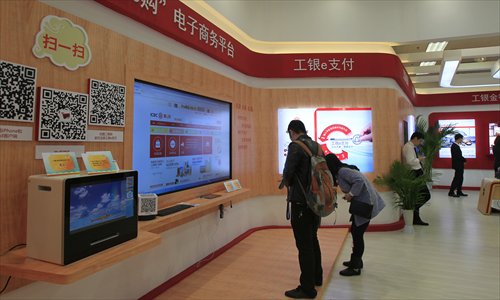
Visitors look at information about ICBC's Internet finance services in October 2014. Photo:CFP
Industrial and Commercial Bank of China (ICBC), the world's largest lender by assets, on Tuesday unveiled a white paper on blockchain technology applications in finance, the first of its kind in the banking sector.
The white paper's publication amid a growing focus on China's blockchain push could rev up the economy's fintech innovation engine amid the global COVID-19 pandemic, market watchers said.
Finance is the most-explored area for blockchain technology-powered application scenarios, according to the white paper.
Some 420 blockchain information and services providers are registered in China. There are 72 firms offering blockchain-based financial services, 17 percent of the total, and they have registered 120 types of financial services, read the white paper.
Financial institutions including banks have been moving actively into the use of blockchain, leveraging their financial advantages.
In the case of ICBC, which set up a special blockchain research team in 2016, the bank said it had in recent years explored the integration of blockchain technology into artificial intelligence (AI), big data, 5G, and the Internet of Things (IoT), and it has created an industry leading enterprise-level blockchain technology platform.
The bank also launched blockchain-based services to track flows of funds amid the fight against the coronavirus epidemic and a simultaneous push for work resumption. The services are now up and running on the part of the Red Cross Society of China's Guangxi Branch and the Zhuhai Charity Federation, and will be gradually offered to domestic commonweal and charity institutions, according to ICBC.
The white paper came after an announcement on Monday by China's top economic planner that officially includes blockchain into the nation's new technology infrastructure drive as ramped-up investments into emerging technologies such as AI, cloud computing, and IoT.
A blockchain technology group study session of the Political Bureau of the Com-munist Party of China Central Committee in October 2019 also called for greater focus on the technology, making it a vital breakthrough for indigenous innovation of core technologies.
The domestic banking sector mainly uses consortium blockchains and in some cases private blockchain technologies, facilitating cross-bank transfers, settlements between a bank's head office and its branches, and anti-money laundering activities, Cao Yin, managing director of Digital Renaissance Foundation in Shanghai, told the Global Times on Tuesday.
The US and Europe have moved one step further in blockchain's applications in finance, with a decentralized finance movement all the rage in the financial sectors in these countries that aims to transform financial products into program-powered protocols that can run themselves without human intervention, Cao said.
It's unclear if China would opt for the more revolutionary approach, but if the nation did so, just as its central bank took the global lead in testing its digital currency, the US payment-sector dominance might be challenged, he commented.
